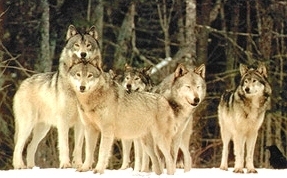
Home
Encyclopedia
About/Contact
Links
 Wolves were common in W Europe and the US but were widely killed off, largely because of prejudice. They are making a slow comeback but in Britain need to be reintroduced. Wolves are an ethical as well as a conservation issue. © Artwolf |
What is the Problem?
You may have doubts about what people are doing to animals. Every year humanity turns literally billions of animals into commodities for human use, from food to quack medicine and is driving millions of species to extinction in a holocaust. Many people cross the line into animal oppression whithout realising it or by denighing it. The reasons why people act the way they do to animals often seem vague and facts are uncertain. In particular, people hold opposing views about how to treat animals. It is therefore difficult to know what to think or do to improve the lot of animals and animal-human relations.
There are fundamentally two points of view. One view seeks to persist in humanity's roots, following the course of life humans have always lived, by hunting and eating animals and otherwise using them. The other view wants humanity to develop a strong sense of moral integrity as the senior intelligent species on Earth, the only species to reach into space and go beyond biological evolution.
Is Homo sapiens an intelligent ethical being? If humanity survives the next one or two hundred years (improbable) and continues to make progress (not inevitable) it will evolve from its organic roots into a new kind of species. The forces that shape our descendants are beyond our control, but by striving for a sense of morality now we can try to embed in future generations a sense of right and good so that they wil not go morally astray with their power.
What do you gain from this Encyclopedia?
What do you gain from this Encyclopedia? Get satisfaction. Sus out your views and defend them rationally in public. Raise the ethical standards of humanity and actively contribute to the well-being of animal-kind. Convince and win over people to change their attitudes for the better. It is said that more people are reckoned to be engaging in ethical argument about animals these last twenty years than in the whole of the last two thousand years.
Why Animal Ethics Now?
Why are people only just beginning to discuss animal ethics? A number of thinkers before and during the 1960's tried to engage public attention about what is going on. But it is only since the 1970's that the public has seemed ready to take notice. In particular, the Australian Philosopher Peter Singer is widely given credit for ignighting public and academic interest in the ethics of animals by his 1975 book Animal Liberation, now translated into over 17 languages.
Do Philosophical Ideas Work?
The human-world is constantly shaped and re-shaped by philosophical ideas and ethical reasoning permeates and influences our everyday world. Generations of people acquire philosophical ideas and values without realising it or knowing where the ideas come from. They come from individuals who lived and died before us, examples are John Lock and Karl Marx.
Few things in human society are bigger than revolutions and revolutions are made of philosophical ideas. John Locke (1632 - 1704), English physician, public servant and philosopher, significantly helped lay the foundations of our liberal society. His ideas about government, tyranny and the rights of man were pivotal in supplanting the British monarch in the 'Glorious Revolution' of 1688 and in helping to bring about the American and French revolutions in the 18th century.
Another pre-eminent thinker was a German emigre who settled in London and spent much of his time writing at the British Library. Karl Marx (1818 - 1883) wrote the intellectual foundation of Communism that fuelled the Communist revolutions of Russia and China in the 20th century.
Hundreds of millions of people today still live under the ideas of these two thinkers, ample demonstration of the power and pervasiveness of philosophical ideas. If you are not convinced, two more examples are to ask where our concepts of soul and man's place in the universe come from (see Copernicus and Darwin).
| © 2004 Roger Panaman All rights reserved |